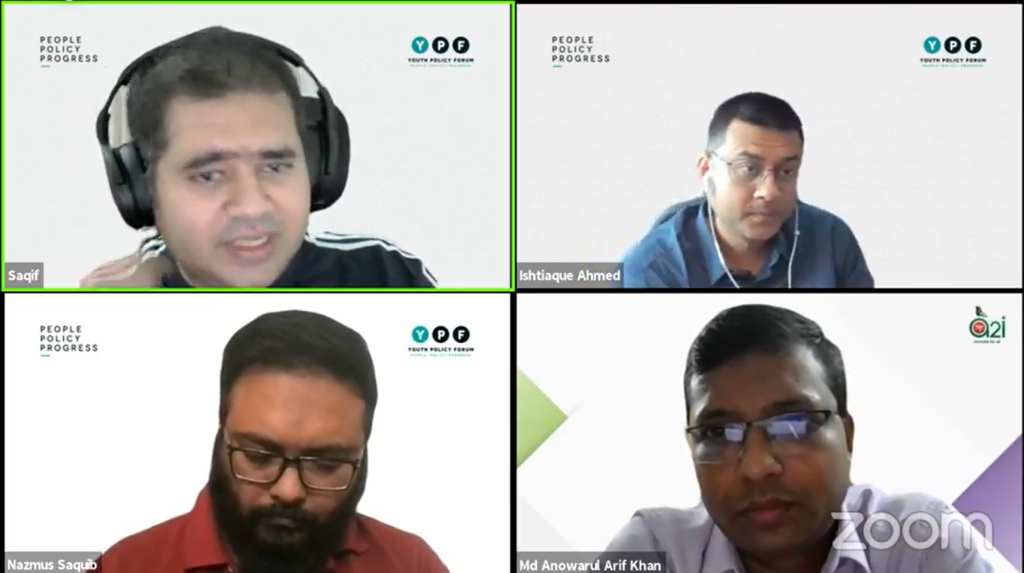Written by: Prokriti Das Srishti
The information and communication technology sector has seen a lot of achievements in the last decade. Extensive improvement in the usage of mobile phones as well as the internet has been observed. E-governance has been introduced in the country, which seems to have accelerated numerous government activities. Despite many adventures, the increasing rate of risks to data security remains one of the most concerning facts.
In the webinar titled “Digital Governance in Bangladesh”, arranged by the Youth Policy Forum, panelists are seen discussing all the aspects of how strong the nation’s position is in technology towards 2021.
The esteemed panelists included MD. Anowarul Arif Khan, Results Management Expert, Team Lead, SDG & Data, a2i Program, Sharifa Sultana, HCI Researcher, Ph.D. Candidate, Cornell University, Khan Muhammad Saiful Alam, YPF Fellow, Technology, Artificial Intelligence, and Society and, Nazmus Saquib, YPF Fellow, Technically, Artificial Intelligence and Society.
Syed Ishtiaque Ahmed, YPF Fellow, Technology, Artificial Intelligence, and Society, moderated the webinar. This webinar was part of the “Road to Reforms” series and the first episode under the “Towards a New Social Contract: Technology for Masses” section.
The discussion from the panel started with advice on how to control the spread of misinformation and that too without hindering one’s freedom of speech. Panelist Saqiful Alam said, “In the past we were living in a situation where there was lack of information but nowadays there is so much information especially misinformation, disinformation and mal-information that it has become a challenge to find out and know the real, clear information.” About solutions, he said, “The most important solution I would say is, you know, modifying education to teach students, to teach our younger generation, our future, on how to tease out the right information from the wrong, from the mal-information.”. As the panelist has mentioned, many influential companies and communities like Google and TikTok have a moderator team to help them.
In response to the role of tribal communities, most of them rely on rumors to feed and strengthen their culture, and how fact-checking might cut their contribution down in present times, given that many movements were influenced and initiated by rumors, MD. Anowarul Arif Khan said, “everyone needs to be sensitive to the true information and its source in order for all to work smoothly and effectively.”
When asked about what measures can be taken by modern technology to tackle this issue of misinformation, Nazmus Saquib responded by saying, “we can help by empowering the influential people, be it celebrities or leaders of a particular community so that the person whom people follow, has the correct information and can act as the cross-checking factor. He also said, “social media is not only physically localized at this point, we can get a view of the whole world sitting in the comfort of our country.” He mentioned how the authoritative figures have changed gradually, from village heads to a better developed or first world country like the USA and people tend to think whatever information they are providing is correct because of this authoritative aspect.
When the subject of harassment was introduced, especially against women and people of the third gender and how they were personally and publicly attacked for expressing their point of view and exercising their freedom of speech, panelist Sharifa Sultana highlighted that this harassment does not stay within the borders of social media but also predominantly exists in the society. She mentioned how many victims of harassment, especially women, remain quiet about it because the stigma around a woman being harassed still exists, which terms her “weak,” and societal issues affect her prospects of marriage and career more than the actual offender. According to her, his tendency of hiding gives rise to another case where when finally the victims vocalize the harassment, the mob does not believe it to be accurate as it was unheard of for so long.
The question of “who” really should be the authority and what happens when the “wrong” comes from this authority. In response to this, Saquib Alam said, “we are in such an age where information production dissemination is faster than even sitting down and thinking should we do it.” He pointed out how it has become so easy to share an opinion piece without even thinking twice, just by clicking the “share” button on Facebook. As a result, people are being exposed to a vast range of global information, which is alarming. He said, “this is the biggest challenge the homosapiens as a species faces. This would be the evolutionary boundary we need to cross in terms of understanding what is the right balance here because there is no right answer here, honestly.”
Theft of intellectual property is prevalent nowadays, especially among the newly risen entrepreneur community of the country. MD. Anowarul Arif Khan, in response, informed of a2i’s services where anyone can join and talk to district-level officials about any social problem they might be facing, and the moderation team conducts a selection process to filter out, again, any misinformation and then connects the person to the necessary official or ministry. He added E-Governance consists of e-participation of social media, so one cannot avoid it. What one can do is spread the logical use of these platforms.
Before signing off, the last few advisory solutions from panelists included suggestions to have a set of guidelines from people who are accountable and also whose decisions are regularly checked, the balance of the agency related to Identity, promoting scientific mindset, for example, questioning something before blindly believing and establishing trust between the government and the citizens, the institutions and the professionals and a sharing mindset needs to be implemented. So, everyone must play their vital role from their place of work.
The Author is an Associate of English Editorial and Content Team of YPF.
